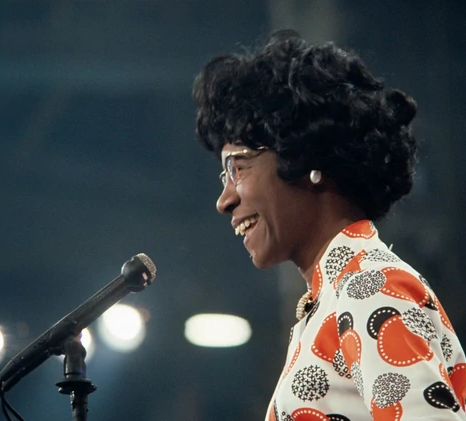Written by: Emily Vargo
On November 30, 1924, a strong, intelligent woman who wasn’t afraid to break down barriers was born in Brooklyn, New York. This woman is Shirley Anita St. Hill Chisholm.
Shirley was the oldest of four sisters, and her parents were immigrants. When she was five years old, she and two sisters were sent to their grandmother’s house in Barbados, where they could be taken care of.
Shirley once said, “Granny gave me strength, dignity, and love. I learned from an early age that I was somebody. I didn’t need the black revolution to tell me that”.
Shirly lived on her grandmother’s farm and attended a one-room schoolhouse until 1934, when she returned to the United States. In 1939 Shirly attended Girls’ High School in Brooklyn, where she thrived in academics and became Vice President of the Junior Arista Honor Society.
After high school, Shirley attended Brooklyn College, where she didn’t have to pay for tuition due to scholarships and could live at home and commute to school.
Shirley graduated college in 1946, majored in Sociology, and minored in Spanish. Shirley was a member of Delta Sigma Theta and the Harriet Tubman Society. In the late 1940s, Shirley met Conrad O. Chisholm, and they would later wed in 1949.
After graduating from college, Shirly began working as a teacher’s aide at the Mt. Calvary Child Care Center in Harlem. While she was teaching, she attended night classes at Teachers College Columbia University and earned her masters in Childhood Education in 1951.
Shirley entered the political world in 1953, where she joined Wesley “Mac” Holder’s effort to elect Lewis Flagg Jr. to the bench as the first black judge in Brooklyn. Later, Shirley left the Flagg election group in 1958 after they transformed into the Bedford–Stuyvesant Political League (BSPL).
Shirley left due to clashing with the group, where she wanted to push to give more female members of the group more input, but the group didn’t agree. Shirley worked and volunteered in clubs like the Brooklyn Democratic Club and League of Women Voters.

In 1960 Shirley joined the Unity Democratic Club, where she helped campaign Thomas R. Jones run for an assembly seat and won after their second try, which made Jones Brooklyn’s second black assemblyman. Shirley was a New York State Assembly member from 1965 to 1968.
Then in 1968, Shirley was elected as the Democratic National Committeewoman. In 1960 Shirley ran for the US House of Representatives for the New York 12th Congressional District. Quickly Shirley gained organizational support, and her slogan was “Unbought and unbossed.”
On June 18, 1968, Shirley won the primary election in an upset election beating James Farmer, making Shirley the first black woman elected into Congress.
When Shirley entered into Congress, the Speaker of the House assigned Shirley to serve on the House Agriculture Committee even though she represented an urban district.
Shirley found this placement irrelevant to her constituents and was very angry about the placement. Shirley confided in Rebbe Menachem M. Schneerson about her anger about the placement. Schneerson suggested that Shirley use surplus food to help the poor and hungry. She would go on to do just that.
Shirley worked hard on expanding the food stamp program. She played a critical role in creating the Special Supplemental Nutrition Program for Women, Infants, and Children (WIC).
She finally was rewarded a place on the Education and Labor Committee, which was the committee she wanted all along.
Later, Shirley was assigned to the Veteran’s Affairs Committee.
During Shirley’s days in Congress, she only hired women for her Washington DC office and Brooklyn District office, and half of them were black. In the later years of her term, she did hire some men, but most of her employees were women. Shirley would later state that she faced more discrimination due to her gender than her race.
In 1971 Shirley joined the Congressional Black Caucus as its founding member. In the same year, she was also a founding member of the National Women’s Political Caucus. On January 25, 1972, in a baptist church in Shirley’s district in Brooklyn, Shirley announced her presidential bid.
Shirley became the first African American for a major party’s nomination for the President of the United States. This also made Shirley the first woman to ever run for the Democratic Party’s Presidential Nomination.
Shirley stated, “I am not the candidate of black America, although I am black and proud. I am not the candidate for the Women’s Movement of this country, although I am a woman and equally proud of that. I am the candidate of the people, and my presence before you symbolizes a new era in American political history”.
Unfortunately, Shirley wasn’t taken seriously as a candidate and didn’t win the nomination to be the Democratic Nominee for the Presidential election.
In February of 1982, Shirley announced her retirement. Even though she was retired, she was still involved in politics and returned to teaching.
On January 1, 2005, Shirly Chisholm passed away, leaving an inspiring legacy behind as well as her slogan “unbought and unbossed.”
Leave a Reply
You must be logged in to post a comment.